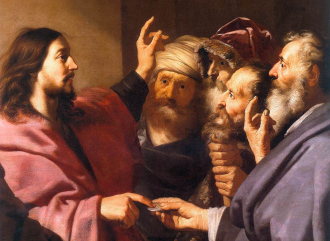The Pharisees were a New Testament political - religious group of influential Jews active in Palestine from the second century B.C. through the first century A.D. They originated roughly around 150 B.C. from a group of scribes and sages who harkened back to the days of the prophet Ezra and the Great Assembly. They had great influence with the masses.
The Jewish historian Josephus (who was one of the Pharisees himself) stated the following about them.
"And concerning these things it is that great disputes and differences have arisen among them, while the Sadducees are able to persuade none but the rich, and have not the populace obsequious (obedient or giving deference) to them, but the Pharisees have the multitude on their side." (Antiquities of the Jews, Book 13, Chapter 10)
While their rivals received backing from the rich and elite, the Pharisees were popular with the people, who considered them the highest religious authority. They were especially influential in local synagogues. Jesus referenced their authority when he said they sat in "Moses' seat" (Matthew 23:2).

The New Testament Greek word for this group is Pharisaios (Strong's Concordance #G5330). It comes from the Hebrew word parash (Strong's Concordance #H6567) which means, "to separate or disperse" or "separated ones." They separated themselves not only from the heathen but also from other influences that regularly came into Palestine. They advocated and adhered to a scrupulous observance of both the written and oral laws as interpreted by Scribes, in accordance with tradition.
The Pharisees also believed that in addition to the written Torah (the first five books of the Old Testament) there existed yet another Torah. This "other" Torah was the Oral Torah, Oral Tradition, or "traditions of the elders" (Matthew 15:1 - 2). It comprised interpretations of the law that they thought God verbally gave to Moses but which were not included in the written version of the law. They asserted that the written Torah was not complete in and of itself and needed the Oral Torah.
Traditions in New Testament
The New Testament mentions several traditions practiced by the Pharisees. They fasted often (Matthew 9:14, Luke 18:12), and ceremonially washed their hands often, especially before eating bread. They believed "unwashed" hands were defiled. They also frequently washed cups, pots, pitchers, tables, and other things used in preparing and eating food.
For the Pharisees and all the Jews, holding fast to the tradition of the elders, do not eat unless they wash their hands thoroughly.
Even when coming from the market, they do not eat unless they first wash themselves. And there are many other things that they have received to observe, such as the washing of cups and pots and brass utensils and tables (Mark 7:3 - 4, HBFV).
The Pharisees additionally held to the false belief that contributions dedicated to the temple (called Corban or a gift to God) were more important and took precedence over helping their father and mother (the 5th commandment).
Then He (Jesus) said to them, "Full well do you reject the commandment of God, so that you may observe your own tradition.
"For Moses said, 'Honor your father and your mother'; and, 'The one who speaks evil of father or mother, let him be put to death.' But you say, 'If a man shall say to his father or mother, "Whatever benefit you might receive from me is corban" (that is, set aside as a gift to God), he is not obligated to help his parents.' (Mark 7:9 - 11, HBFV).
These religious leaders even went so far as considered plucking an ear of corn to eat on the Sabbath as work and a breaking the fourth commandment (Matthew 12:1 - 2)!
Pharisaic leaders were called "rabbis" or "teachers" (Matthew 23:6 - 7, John 3:1 - 10) and often attracted "disciples" to themselves (Mark 2:18; Matthew 22:16; Luke 5:33). Some of them were members of the Sanhedrin, the supreme council of the Jews that had jurisdiction over Jewish matters (Acts 5:34).
Opposition
The Gospel accounts portray the Pharisees as opposing both John the Baptist (Luke 7:30) and Jesus (Matthew 12:38 - 39, 15:12; John 7:47 - 48). They also, early in Jesus' ministry, plotted with the Herodians to kill him (Mark 3:6). Not all the them, however, were against the gospel or opposed it all of the time. Some of them, like Nicodemus, were favorable to Jesus and believed in his message (John 3:1 - 2, John 7:50). The early church was composed of many of them (Acts 15:5).
Some of Jesus' harshest criticisms given during his ministry were against the Pharisees. This was likely due to their popularity with the masses and that most people considered them the highest religious authority (as opposed to the Sadducees).